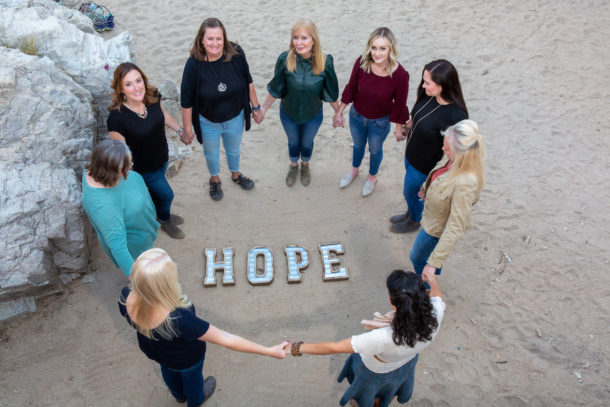What does it mean that we are the bride of Christ?
It means that others are essential to our faith. It means that we aren’t fully who we were intended to be on our own. It also means that we are loved. We are chosen. We are sanctified. The fact that we are the bride means that Christ invites us into an eternal, intimate relationship with Him. He not only saves us from the consequences of our sin but He also redeems us to secure a seat in His presence forever.
The Lovely Bride
Let’s make sure we understand this picture correctly. The bride isn’t you or me individually. The bride is Christ’s church viewed collectively. Paul says, “So we, though many, are one body in Christ, and individually members one of another” (Romans 12:5). And Christ will come for us!
The grand culmination of history will be our entrance on that glorious day, the wedding day of Christ and His bride. And as Paul reminds us in Ephesians 5, on that day we will be spectacular. You’ve seen glimpses of this in the radiant faces of brides on this earth, haven’t you? Smiles so wide that cheeks ache at night’s end and eyes that sparkle with so much joy they seem like they were photoshopped. Christ is making us even more beautiful. Tim Keller reflects, “When Jesus looked down from the cross, He didn’t think ‘I am giving myself to you because you are so attractive to me.’ No, He was in agony, and He looked down at us—denying Him, abandoning Him, and betraying Him—and in the greatest act of love in history, He STAYED. He said, ‘Father, forgive them, they don’t know what they are doing.’ He loved us, not because we were lovely to Him, but to make us lovely.”
And Christ does make us lovely! In Isaiah 61:10 we see a reflection of what we, as His dazzling bride, will look like. Isaiah says, “He has clothed me with the garments of salvation and wrapped me with a robe of righteousness.” This endeavor to make us lovely is, by its very nature, a corporate endeavor. Our identity and destiny is connected to the body to which we belong. There are some important takeaways when we consider this.
You Can’t Hate The Church
We can’t love Christ and hate the church. Our love is connected to the body we are a part of. We must come to terms that we are not fully who God intended us to be outside of the church.
From the resurrection of Jesus onward, the New Testament is the story of God’s work of salvation in and through the local church. This design is a reflection of His character. Our three-in-one God is a God in whom perfect community exists. Part of being created in the image of God is being created to exist in community. God’s work has always been done through a people and is leading toward the union of a diverse people.
It’s The Church’s Fault
Any person who has spent any time with the church has been failed by the church. Churches are filled with humans who can fail in all sorts of ways. We can be lousy at welcoming newcomers, choosing instead to catch up with our friends; we can play good music badly or bad music well; and I’ve preached more than a few sermons that I wish I could’ve had a chance to redo—either because they were boring, awkward, or unclear.
The Christian community shouldn’t just naturally click. We come from different backgrounds with different ethnicities, different political allegiances, and different socio-economic statuses. We are not naturally friends! To forge friendships in this group of misfits is a true work of God. We shouldn’t expect friendship to come easily and we shouldn’t be surprised when we are let down. Instead, we ought to commit ourselves all the more to doing everything in our power to step into relationships with those who aren’t naturally our friends.
Pastor Dietrich Bonhoeffer has a rebuke for us when the sins of other Christians loom large to us. He says, “If my sinfulness appears to me to be in any way smaller or less detestable in comparison with the sins of others, I am still not recognizing my sinfulness at all. . . . How can I possibly serve another person in unfeigned humility if I seriously regard his sinfulness as worse than my own?” In other words, when we are discouraged and frustrated by the church, are we appropriately considering our failings or are we so focused on the failings of others that we cannot see our own sin? Somehow, we see their speck better than our plank.
Outside The Church, No One Is Saved
Give the church a chance. And when she fails you, give her another chance. We don’t really have an option. Our identity is bound up with Christ’s church.
On the final night before He was crucified, Jesus drilled into His disciples how important it was for them to love each other. “By this all people will know that you are my disciples, if you have love for one another” (John 13:35). And then, later that night, Jesus tells His disciples that their unity is of the utmost importance. He prays to His Father that His disciples “may become perfectly one, so that the world may know that you sent me and loved them even as you loved me” (John 17:23).
The early Christians understood the importance of unity in the church. Irenaeus, who lived in the second century, said that the church “is the entrance to life; all others are thieves and robbers.” Origen, during the third century, said, “Let no man deceive himself. Outside this house, that is, outside the church, no one is saved.” And Augustine, who lived in the fourth and fifth centuries, stated, “No man can find salvation except in the church.”
Friends, we need the church. We can’t have the end of God’s story without her. In all her messiness and in all her faltering, you still need her. You need her because God’s Kingdom is bigger than you. You need her because God’s work on earth is through His bride, the church. You need her because just like the church, you are also messy and you also falter. And you need her to call you back to Him.
Standing In Our Identity As The Bride of Christ Together,
John Beeson, Co-Lead Pastor of New Life Bible Fellowship, Tucson, Arizona
Connect with John through his blog at thebeehive.live
John and Angel Beeson are currently working on a book entitled Substitute Identities. Our culture and our hearts offer us substitute identities in place of our true identities in Christ. Substitute Identities is for those who struggle to know and live into who they are in Christ.
1 Frank Newport, “2017 Update on Americans and Religion,” Gallup, December 22, 2017, https://news.gallup.com/poll/224642/2017-update-americans-religion.aspx.
2 Timothy Keller, The Meaning of Marriage: Facing the Complexities of Commitment with the Wisdom of God, Penguin Books, 2011.
3 Dietrich Bonhoeffer, Works, Volume 5: Life Together, Fortress Press, 1996.
4 Irenaeus, Against Heresies, Book III, Veritas Splendor Publications, 2012.
5 Origen, In Iesu Nave homiliae.
6 Augustine, Sermo ad Caesariensis Ecclesia plebem.







0 Comments